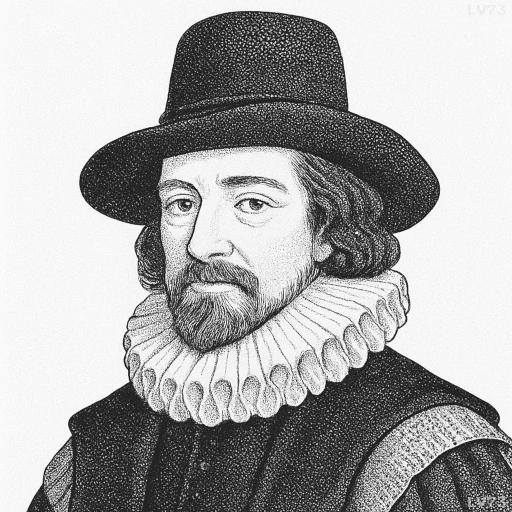“A little philosophy inclineth man’s mind to atheism, but depth in philosophy bringeth men’s minds about to religion.”

- January 22, 1561 – April 9, 1626
- Born in England
- Philosopher, theologian, jurist, politician, aristocrat
table of contents
Quote
“A little philosophy inclineth man’s mind to atheism, but depth in philosophy bringeth men’s minds about to religion.”
Explanation
In this quote, Francis Bacon suggests that superficial knowledge or a shallow understanding of philosophy may lead individuals to question or reject religious beliefs, often leaning toward atheism. However, he argues that a deeper and more comprehensive exploration of philosophy and the natural world ultimately leads to a greater appreciation of religion. According to Bacon, when one truly delves into philosophy, understanding the complexities of existence, morality, and the natural order, it naturally leads to the recognition of a divine presence or higher power that underlies all of creation. Bacon implies that the more profound questions about life, existence, and the universe point to the existence of a higher intelligence or divine purpose, which can reaffirm religious faith.
Bacon’s view reflects the Renaissance and early modern interest in the relationship between reason and faith. During this time, many thinkers were attempting to reconcile the growing field of science and philosophy with religious belief, seeing no inherent contradiction between the two. Bacon, himself a proponent of empiricism and the scientific method, understood that the pursuit of knowledge could lead to revelation and a deeper understanding of the divine. For Bacon, the natural world and the laws of nature were evidence of a higher intelligence, and the pursuit of philosophical inquiry could strengthen belief in a creator or divine order.
In modern times, this quote resonates with the idea that critical thinking and deep reflection on life and existence often lead individuals to a more nuanced view of religion and spirituality. It suggests that shallow or superficial approaches to understanding the world may lead to skepticism or doubt, but a more thorough understanding of philosophy, science, and the complexities of existence can point back to the possibility of divine purpose. Bacon’s insight encourages a balanced approach to both faith and reason, recognizing that true wisdom often leads to an integration of the two, rather than an opposition.
Would you like to share your impressions or related stories about this quote in the comments section?


